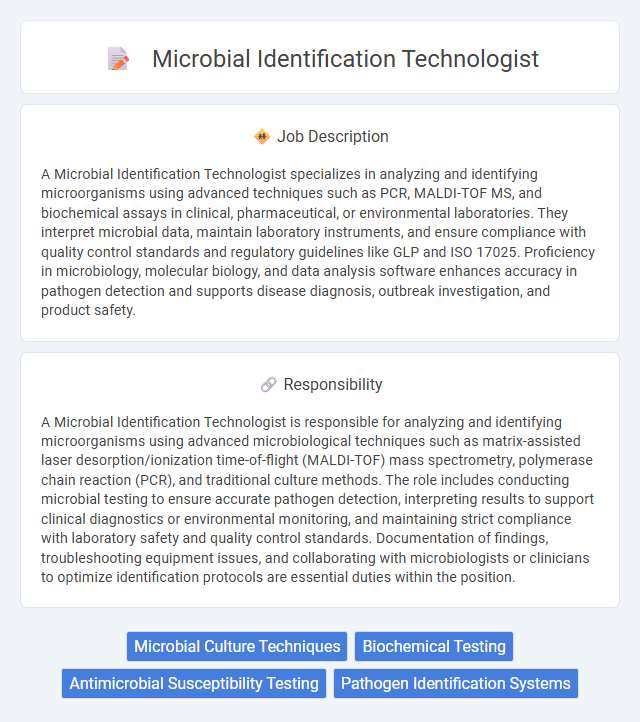
A Microbial Identification Technologist specializes in analyzing and identifying microorganisms using advanced techniques such as PCR, MALDI-TOF MS, and biochemical assays in clinical, pharmaceutical, or environmental laboratories. They interpret microbial data, maintain laboratory instruments, and ensure compliance with quality control standards and regulatory guidelines like GLP and ISO 17025. Proficiency in microbiology, molecular biology, and data analysis software enhances accuracy in pathogen detection and supports disease diagnosis, outbreak investigation, and product safety.
Individuals with strong analytical skills and a keen attention to detail may be well-suited for a Microbial Identification Technologist role. Those comfortable working in laboratory environments and handling microorganisms under strict safety protocols will likely find this job fulfilling. Candidates who prefer structured tasks and have an interest in microbiology or biotechnology could probably thrive in this position.
Qualification
Microbial Identification Technologists require a Bachelor's degree in microbiology, biotechnology, or a related life science field, coupled with hands-on experience in microbial culturing, DNA sequencing, and laboratory techniques such as PCR and MALDI-TOF MS. Proficiency in bioinformatics tools and microbial taxonomy databases is essential for accurate identification. Strong analytical skills and knowledge of regulatory standards in clinical or industrial microbiology settings enhance job performance.
Responsibility
A Microbial Identification Technologist is responsible for analyzing and identifying microorganisms using advanced microbiological techniques such as matrix-assisted laser desorption/ionization time-of-flight (MALDI-TOF) mass spectrometry, polymerase chain reaction (PCR), and traditional culture methods. The role includes conducting microbial testing to ensure accurate pathogen detection, interpreting results to support clinical diagnostics or environmental monitoring, and maintaining strict compliance with laboratory safety and quality control standards. Documentation of findings, troubleshooting equipment issues, and collaborating with microbiologists or clinicians to optimize identification protocols are essential duties within the position.
Benefit
Microbial Identification Technologists likely benefit from hands-on experience with advanced laboratory techniques and cutting-edge identification tools, enhancing their technical skill set. They probably gain opportunities for career growth in various sectors such as healthcare, pharmaceuticals, and environmental science. The role may offer job stability and competitive salaries due to the increasing demand for microbial analysis in public health and industry.
Challenge
Microbial Identification Technologists likely face challenges related to accurately detecting and characterizing diverse microorganisms, demanding precision and advanced analytical skills. The complexity of microbial ecosystems and the need for rapid, reliable identification may require continuous adaptation to evolving technologies and protocols. Maintaining stringent quality control while managing high-throughput samples could further enhance the difficulty of the role.
Career Advancement
Microbial Identification Technologists gain expertise in advanced laboratory techniques such as MALDI-TOF mass spectrometry and genomic sequencing, positioning themselves for roles in clinical diagnostics, pharmaceuticals, and biotechnology industries. Mastery of microbial taxonomy and bioinformatics tools enhances their ability to contribute to research and development, leading to opportunities as senior technologists, laboratory managers, or quality assurance specialists. Continued professional development and certification in microbiological methods drive career progression and specialization within infection control and public health sectors.
Key Terms
Microbial Culture Techniques
Microbial Identification Technologists specialize in advanced microbial culture techniques to isolate and identify bacteria, fungi, and other microorganisms from clinical, environmental, or industrial samples. Proficiency in selective media preparation, incubation conditions, and biochemical assays enables accurate characterization of microbial strains essential for diagnostics and research. Mastery in interpreting growth patterns and morphology supports rapid identification critical for infection control and pharmaceutical development.
Biochemical Testing
Microbial Identification Technologists specialize in biochemical testing to accurately identify microorganisms by analyzing enzyme activities, metabolic processes, and substrate utilization patterns. They perform assays such as API strips, catalase tests, and oxidase tests to differentiate bacterial species and ensure precise microbial classification. Proficiency in interpreting biochemical reactions contributes to critical applications in clinical diagnostics, pharmaceutical quality control, and environmental microbiology.
Antimicrobial Susceptibility Testing
Microbial Identification Technologists specializing in Antimicrobial Susceptibility Testing (AST) apply advanced microbiological techniques to determine the effectiveness of antibiotics against pathogens. They utilize automated systems such as VITEK 2 and MALDI-TOF alongside manual methods like broth microdilution to accurately identify microbial resistance patterns. Proficiency in interpreting MIC values and maintaining quality control standards ensures precise guidance for clinical treatment decisions and infection control measures.
Pathogen Identification Systems
Microbial Identification Technologists specialize in analyzing pathogen identification systems to accurately detect and classify microorganisms responsible for infectious diseases. They utilize advanced techniques such as MALDI-TOF mass spectrometry, PCR-based assays, and automated identification platforms like VITEK and BD Phoenix to ensure rapid and precise microbial profiling. Expertise in interpreting diagnostic data and maintaining quality control standards is essential for supporting clinical decision-making and improving patient outcomes.
 kuljobs.com
kuljobs.com